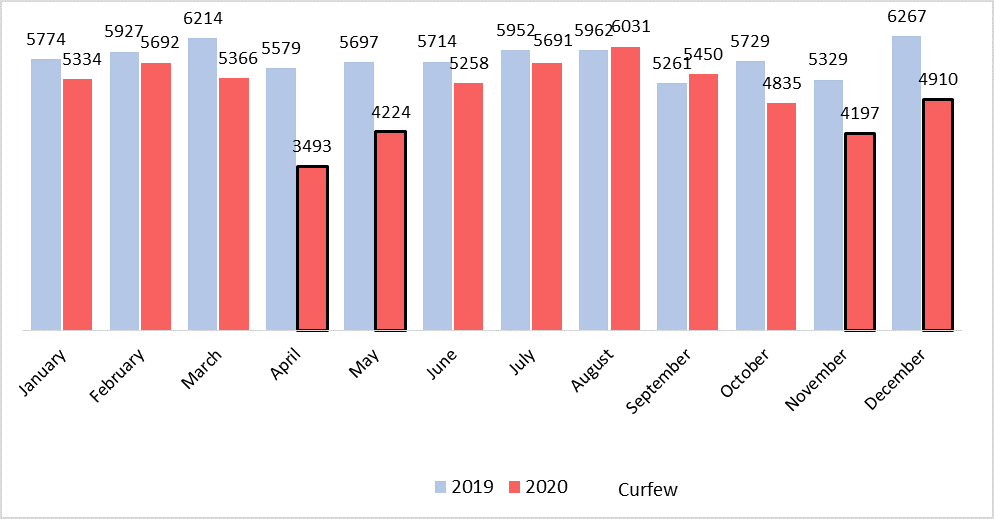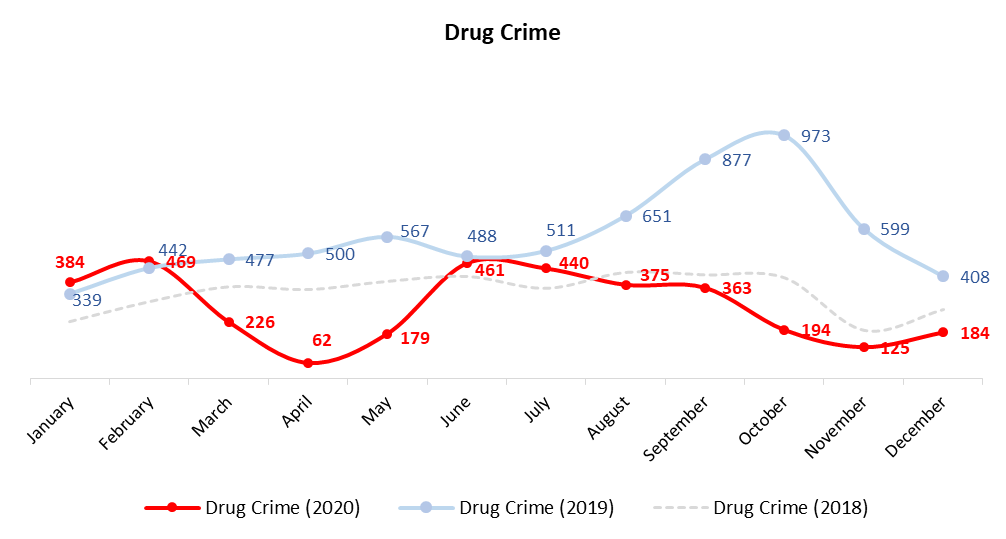


In 2020, the COVID-19 pandemic taking place in the world led to an increased risk of deteriorating criminogenic conditions. For example, the deterioration of the socio-economic situation in the country, the massive reduction of jobs, etc., contains significant risks of an increase in crime, especially economic crime. However, in 2020, the specifics of fighting the pandemic to prevent the spread of the virus have led to the isolation of numerous people in a single space with potential abusers. On the other hand, the specifics of combating pandemics were also significant deterrents and an additional mechanism for tackling some crimes. For example, the introduction of a state of emergency, the curfew, the restriction of crowded economic activities, all could have been an important deterrent to crime.
In order to assess the impact of the pandemic on the reported crime rates in the country, IDFI analyzed the crime statistics registered by the Ministry of Internal Affairs of Georgia. Since 2018, the Ministry of Internal Affairs of Georgia has been proactively publishing crime statistics by different types of crime on a monthly basis, enabling us to assess the impact of the pandemic and restrictive measures on specific crimes.
- A total of 56,596 crimes were reported in 2020, which is 11.7% less than in 2019.
- In 2020, despite the decrease in the overall crime rate, the upward trend in various crimes continued. For instance, the rate of premeditated homicide increased by 39.5%, incitement to suicide + 6.3%, threats + 36.3%, cybercrime + 18.7%, domestic violence + 6.9%.
- The decrease in the total crime rate registered in 2020 is largely due to the critical decline in criminal offenses against property (-3,149 cases) and the number of drug offenses (-2,963 cases).

Crime statistics by months
- The reduction of crime rates was significantly affected by the state of emergency declared in the country in the fight against the pandemic and the curfew. For example, theft rates, which account for 32% of all crimes, fell by 40% in April 2020 compared to the same month last year.
- From June 2020 (with the lifting of restrictions) onwards, the number of crimes increased significantly, and in August-September exceeded the numbers from the same periods of the previous year.
- The number of crimes starts to decrease again from October,which may be related to the reduction of control over certain crimes during the pre-election period. For example, drug crime in October 2020 decreased by 80% compared to the same month the previous year.
- The rate of domestic violence increased by 7% in 2020. However, according to the monthly reported cases of domestic violence, the number of registered cases during the months of restrictions and curfew did not increase.

Comparison of drug crime rates registered in 2020 with the same period of the previous year
- In 2020, cybercrime increased significantly during the restrictions period. In April 2020, 303 computer crime cases were reported, a record for the last 4 years.
- In 2020, despite the restrictions on traffic, the traffic crime rate increased by 7.7%.
The analysis of the statistics of the Ministry of Internal Affairs of Georgia shows that the decrease in the overall crime rate in 2020 is largely due to the restrictive measures imposed in the fight against the pandemic and has little to do with improving the criminogenic situation in the country. However, the significant decline in certain crimes (such as drug offenses) is likely to be related to the reduction of police control during the election year. The deteriorating criminogenic situation in the country is evidenced by the growing trend of crimes against life. Additionally, the Ministry of Internal Affairs requires more effort to fight cybercrime, which is increasing every year, and their clear-up rate does not reach 10%.
Analysis of the monthly crime data registered in 2020, as well as the worsening socio-economic situation of the country as a result of the pandemic, creates negative expectations regarding the criminogenic situation in the country after the temporary restrictions are lifted. Therefore, in order to avoid a deterioration of the criminogenic situation, special efforts of the relevant agencies in the post-pandemic period are required.
/public/upload/Analysis/Crime-Statistics-EngFull.pdf
The study was prepared in frames of the project – Empowered Civil Society and Enhanced Beneficial Ownership Transparency Standards for Good Governance – funded by the Governments of Czechia, Hungary, Poland and Slovakia through Visegrad Grants from International Visegrad Fund. The mission of the fund is to advance ideas for sustainable regional cooperation in Central Europe.
The responsibility of the content of the article lies with the Institute for Development of Freedom of Information (IDFI). It does not necessarily reflect the opinions of International Visegrad Fund.